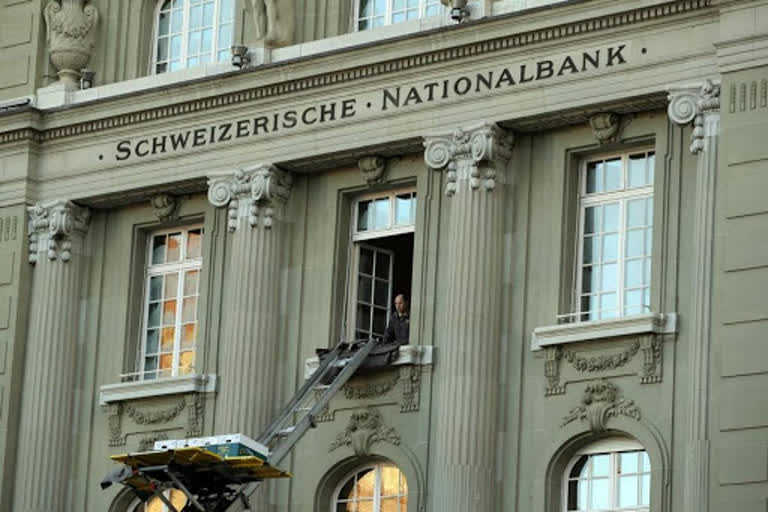New Delhi: India has received the first tranche of swiss bank account details of its nationals under an automatic information exchange pact. The details received by the Central Board of Direct Taxation (CBDT) under the pact is a major milestone in the Modi government's fight against black money.
What is the pact?
- In November 2016, India and Switzerland signed the Automatic Exchange of Information (AEOI) framework for a bilateral exchange of information on financial accounts. This framework covers currently active as well as those accounts that were closed during 2018, the year in which the framework agreement became effective.
- The information exchange, which is governed by strict confidentiality clauses, includes name, address, state of residence, tax identification number, information concerning the financial institution, account balance and capital income.
India is among 75 countries with which Switzerland's Federal Tax Administration (FTA) has exchanged information on financial accounts within the framework of global standards on AEOI, an FTA spokesperson told media.
The next exchange would take place in September 2020, the spokesperson added.
This is the first time that India has received details from Swiss authorities under the AEOI framework, which provides for exchange of information on financial accounts, currently active as well as those accounts that were closed during 2018, the year in which the framework agreement became effective.
However, the AEOI only relates to accounts that are officially in the name of Indians and they might include those used for business and other genuine purposes.
Overall, the FTA has sent information on around 3.1 million financial accounts to the partner states and received information on around 2.4 million from them.
Separately, the Swiss government said in a statement that the number of countries with which the AEOI (Automatic Exchange of Information) has taken place this year is 75, out of which there was reciprocity with 63 countries.
In the case of 12 countries, Switzerland received information but did not provide any, either because those countries do not yet meet the international requirements on confidentiality and data security (Belize, Bulgaria, Costa Rica, Curaçao, Montserrat, Romania, Saint Vincent and the Grenadines, Cyprus) or because they chose not to receive data (Bermuda, British Virgin Islands, Cayman Islands, Turks and Caicos Islands).
The data was collected by the FTA from around 7,500 institutions including banks, trusts and insurers.
"The largest exchange was with Germany, as was the case in the previous year. The FTA cannot provide any information on the number of financial assets," the statement added.
Asked about specific details relating to India, the FTA spokesperson said, "The communication of statistical data is subject to the confidentiality clauses as well."
To another query on the next exchange of information with India, the spokesperson said, "according to the international agreement in place, the exchanges have to take place within nine months after the end of the respective calendar year. This means the exchange takes place in September, except for corrections."
The Swiss government said Switzerland has committed itself to adopt the global standard for the international automatic exchange of information in tax matters.
The legal basis for the implementation of the AEOI in Switzerland first came into force on January 1, 2017.
"The exchanged information allows the cantonal tax authorities to verify whether taxpayers have correctly declared their financial accounts abroad in their tax returns," the FTA said.
It said the exchange will take place with around 90 countries next year. The first such exchange took place at the end of September 2018 with 36 countries.
The Global Forum of the Organisation for Economic Cooperation and Development reviews the AEOI implementation.
Why is this a major development for India?
Switzerland was known across the globe as an alleged safe haven for black money. Even in India, Swiss banks were unpopularly known as go-to destinations to park money accumulated through corruption by politicians, bureaucrats and businessmen.
While Switzerland has always denied being a safe haven for black money, it has begun sharing details after signing of a revised Double Taxation Avoidance Agreement (DTAA) in 2011.
Under the revised protocol, Switzerland started exchanging information on a request and case-to-case basis, for which India's tax officials have to provide proof for financial irregularities committed by the concerned person or the company.
However, this process had been much cumbersome since it involved huge collection of data and paperwork.
To fast-track the exchange of information, both the countries signed a joint declaration in November 2016, under which both countries will start collecting data in accordance with the global standards and exchange at regular intervals.
Unlike the earlier 'on-request' provision of information, the current 'automatic' mode of transmission of financial accounts held by all Indian citizens with Swiss banks would help in curbing tax evasions.
Read more: SBI launches debit card EMI facility for consumer durable loans



